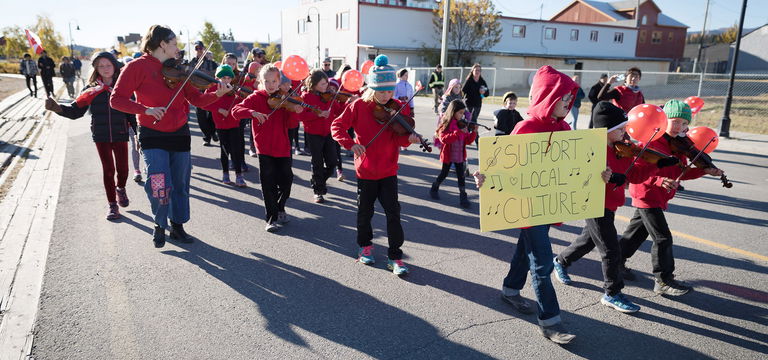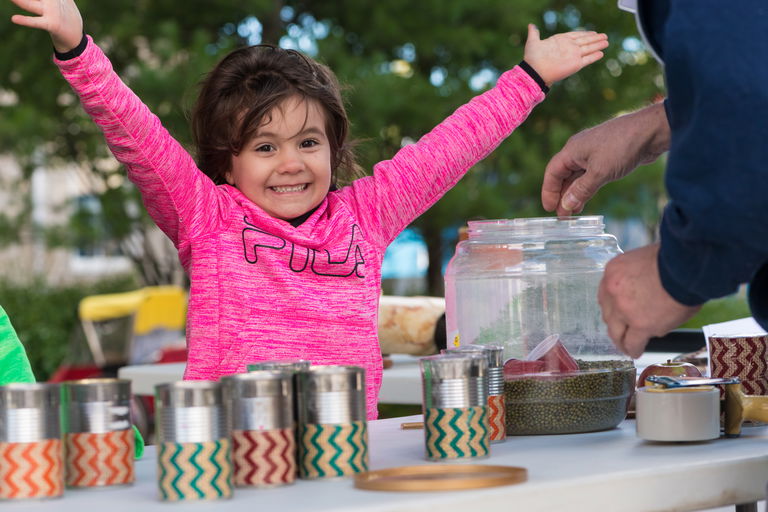School Engagement Tool Kit
Incorporating school programs into your Culture Days strategy is an opportunity to get some of the youngest members of your population involved in a nation-wide initiative. With many schools identifying a need for more arts programming, school programs create an occasion to prioritize arts and culture within our schools. Programs can be any size and scope, allowing for activities to be adaptable based on time, needs, and interests within your community.
Inspired by many successful Culture Days student programs, this page guide will help you to learn more about student-focused programming opportunities, and provide you with resources to develop your own Culture Days initiatives. Whether you are a school teacher, camp counsellor, community educator, or simply wanting to organize events programmed for children and families, this is a resource for you!

Did you know?
- Over one third (37%) of Canadians say their children do not currently receive enough arts and culture education in their school.
- Most Canadian parents (78%) see Culture Days as an opportunity to supplement their children’s exposure to the arts outside of the classroom.
Why participate?
Culture Days is a fantastic way to get students involved in arts programming.
- Programs are non-prescriptive, so you have the opportunity to create an activity that best suits the needs of students and fellow teachers.
- Event organizers and Culture Days staff are here to help. Local organizers can work with you to develop a program that is a good fit for your classroom or school.
- By participating, schools will be joining a nation-wide event that brings together museums, cultural organizations, community groups and other schools. It is a great way to get students excited about Canadian arts and culture!
- Culture Days offers a platform to advocate for arts curriculum in your school. By joining thousands of other students throughout Canada on the Culture Days weekend, collectively we can strengthen our message to school administration, parents, and community arts organizations that arts education is vital and enriching for students’ learning and success.
Program examples
Many things can be a Culture Days program! From small to large, here are some examples of past programs to get you inspired:
Small-scale programs
Small programs usually involve a single class taking part in programs such as an artist visit, a class exhibition opening, a field trip or many other projects.

Example:
- Each year, students from Rowntree Montessori School are invited to perform a dance at the Brampton Public Library. Based on the yearly curriculum, students research popular dances from different countries around the world and vote on which dance they would like to perform at the Library.
Medium-scale programs
Medium-sized programs involve more than just one class - they may involve entire schools or multiple grades. Some past programs include design competitions; , multi-grade exhibitions or school-wide talent shows. Sometimes these programs may be developed over several days or weeks by students in collaboration with visiting artists.
Examples:
-
Local elementary schools in Quesnel, BC were invited to participate in an outdoor, back-to-school art activity. The Quesnel’s Sidewalk Chalk Challenge encouraged artistic expression using sidewalk chalk on the various school playgrounds and paved areas around town. Teachers were contacted early in the year by municipal organizsers and encouraged to participate. The long lead-time ensured many classrooms were able to take part. Children were invited to grab a piece of chalk and create whatever they wanted, making their own temporary mark on the town.ents help interpret the ASL for members of the public.
-
In Milton, ON each year middle-school students from EC Drury School for the Deaf present their own American Sign Language drama or film to the public at the Milton Culture Days hub. Students help interpret the ASL for members of the public.
Large-scale school programs
Large programs are made up of many schools gathering together at a shared venue. This could be a large cultural festival, a music competition, or an art fair.
Examples:
-
In Stavley, AB, Artwork artwork from over one hundred students was collected from three local schools. The art was professionally matted, and put on display for a live art market. These young artists got to showcase their talents and experience their first art show and successful sale.
-
Each year Culture Days Manitoba brings over 750 students to Winnipeg’s historic meeting place, The Forks, for a full day of student-focused cultural programming. Culture Days Manitoba partners with over 15 other non-profit arts organizations to offer unique Student Day experiences to kids age 10 and up. Students can enjoy workshops, perform with their school ensembles on stage, participate in collaborative storytelling and watch stellar student focus performances. All events take place at The Forks campus downtown Winnipeg and involve both indoor and outdoor programming. You can maximize the impact of your event and curriculum connections by having students do a pre and post-event activity.
Here are some suggestions on ways to get children involved before and after the program:

- If you are visiting a site or trying something new, have students do a research project on the topic beforehand. After the program, have students reflect on whether the experience was what they expected
- Watch a film, documentary or YouTube clip of an artist demonstration to generate excitement
- Hold a discussion about arts and culture before taking part in the program. Here are some examples of potential questions that could be tailored to fit the program:
a. Have you ever participated in (x activity) before?
b. Have you ever visited a museum or art gallery?
c. What is art? Let’s make a list of different types of art (ex: dancing, painting, singing, mosaic creation, acting etc.) Is cooking an art? (Have students discuss what art is or is not) Is there a clear answer?
d. Do you like creating or making art? If so, what sort of art do you like to make?
e. What does culture mean to you? How is it different than art? - To inspire further reflection and discussion, consider asking your students the following questions AFTER the outing:
a. Did you enjoy the activity? Why or why not?
b. Was it different from what you expected?
c. Would you consider (x activity) art?
d. What was your favourite or least favourite part?
e. Is it important to take part in arts and culture?
Lesson plan
Teacher and arts educator Douglas Friesen has developed a Culture Days lesson plan centered around the compositional work of Canadian Composer R. Murray Schafer. Download the lesson plan as an easy way to get a class involved and requires minimal resources.
Webinar: Arts Education in the Digital Sphere
Take your Culture Days school engagement online! This webinar looked at current trends in online education programming, investigating the ways arts organizations are creating digital lessons for younger audiences. Discussion revolved around the differences between live and digital education programming, and the ways organizations have utilized web platforms to reach new audiences.
The webinar included presentations from John Dalrymple with Canada’s National Ballet School, Jay Kimball at LiveArts Saskatchewan, and Douglas Friesen, teacher and arts educator.
Planning and organizing your school engagement event
You aren’t doing it alone! When you join Culture Days, organizers can access a plethora of networks and resources that can help with program planning:
- Find potential local collaborators by seeing who else is organizing Culture Days events in your area or consult Canada’s Map of Arts & Learning to find artists who regularly offer educational programming.
- Visit the Organize section of the Culture Days website to find event planning guides, toolkits, webinars and programming strategies for making your event as easy as possible. Get started with the Participation Guide and 100 Event Ideas.
- For large-scale School engagement events, be sure to consult the Volunteer Management Guide for tips on how to successfully marshal your team.
- Download free customizable posters, postcards and other promotional items, which are made available through your dashboard once you have an account on our website.
- Get inspired with stimulating blog stories available on the Culture Days website.